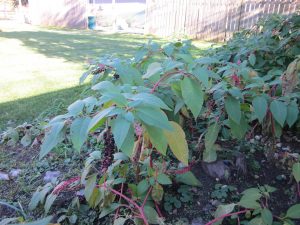Q. We have this plant or weed in our back yard. I can’t identify it by looking on line, and was hoping that you can tell us what it is – and whether or not it is a weed that will destroy other plants or take over the lawn – see attached photo(s). –T.S., Munster, Ind.
A. This commonly seen plant is pokeweed, known botanically as Phytolacca americana. Pokeweed is a perennial plant native to much of North America, but is considered a weed by most gardeners. This is a tall plant (up to 8 feet) with a large taproot. Although the young, emerging new shoots of this plant are considered edible by some (for poke salad), most of the plant, including its stems, leaves, root, and dark purple berries, are toxic to mammals. Many birds, however, relish the fruit. Preventing the plants from producing ripe fruit will help curtail the spread of unwanted new specimens!
Q. Just wondered if you had ever heard about lemon dish soap remedy? Or at least this was the way it was told to me. It goes back to when the woman of the house had to throw out the dish soap. I am 68 so it may have been my grandmother who told me that when they were done with the dishes they would pour the water over the rose bushes. I have always used this method over the year. Well I have had to make it up since I don’t do many by hand. I have since started making a spray bottle of water and lemon dish soap. This summer my small plant was completely devoured by a small bug. I thought it was done for. But I sprayed the plant and within a week it was getting green leaves again. – J.S., Rome City, Ind.
A. Diluted soap solution can be effective for controlling soft-bodied insects such as aphids. But like all remedies, the dose is important. Too much soap will damage the plants, and too little soap will not provide effective results. There are commercially available insecticides that have soap as their active ingredient. Look for an insecticidal soap product that is labeled for use on flowers, and follow the label directives for appropriate application rates.
